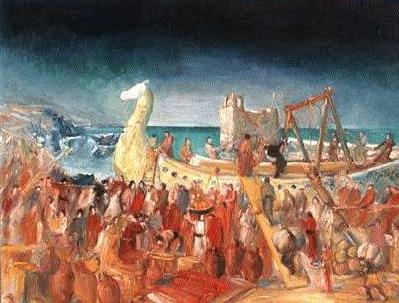There may not be a nation with a more delusion and grotesque form of nationalism than Lebanese nationalism. When ever I think of Lebanese flag-waving I am reminded of de Tocqueville’s observation that “all free people appear glorious to themselves but national pride does not manifest itself equally in all.”
Most people are proud of their nation and celebrate it accordingly. But may even make the occasional comparison to another nation and note with satisfaction that their country has excelled where others have failed. But the Lebanese – whom ironically have no cohesive country – not only celebrate but remark that their “achievements” are a reflection of nothing else but Lebanese genetic superiority over their neighbors. Lebanese do not shy away from expressing their innate superiority over their Middle Eastern peers.

The Phoenicians had boats, ultra-Lebanese nationalists think that makes them “great.”
The Lebanese have long promoted a belief that Lebanon is some sort of special country – the land of the Phoenicians – that has bequeathed to the world disproportionate betterment. The Lebanese like to tout the success of Lebanese overseas as “proof” of the supposedly great genes in Lebanese. And whenever a Lebanese wins anything, the media does not just express pride in the nation’s son or daughter; but editorializes that the victory is like no other victory beforehand. For instance, if a Lebanese wins a medical award the media will portray his award as being better than all the past winners due to some fabricated rational. That such-and-such Lebanese was granted this award and his award is not only a reflection of Lebanese greatness but that is came with added regard from the award committee. The Maronite Patriarch publicly declared in an interview that Lebanese are superior to all the neighbors. Gen. Michel Aoun also once remarked that the Lebanese are “the most civilized people in the world.” A Lebanese buffoon on IB once responded to a critical post I wrote on Lebanon by writing: “WE ARE THE CEDARS, WE ARE THE PEOPLE, WE ARE THE DESCENT, WE ARE THE PHOENICIANS, WE ARE THE GREAT LEBANON.” This is how stupid Lebanese nationalism is. What kind of depraved mind issues comments like this about Phoenicians and Ceders? Many Lebanese believe Ceders are some special tree unlike no other (Ceders are not even exclusive to Lebanon) and that the Phoenicians, which never had a nation, are some special ancient people better then the Romans and Greeks. There is a reason we don’t read about the Phoenician Empire because it wasn’t “great” and neither is Lebanon.
And I put achievements in quotes because very often the things that Lebanese like to brag about are anything but. When Lebanese do not win real awards, they make them up. A casual reader of the Lebanese press will one day hear about some Lebanese winning an award in Thailand for “Best Custom Design” or some great honor like that. The Lebanese are obsessed with bestowing awards on themselves and any sane person cannot help but ask: do such journalists who write said stories actually believe what they are propagating?
Why do the Lebanese have a perverse nationalism? First, there is the strain of right-wing Christian activism in the country that created in the 1950s and 1960s an ethos of Lebanese nationalism that promoted the belief that Lebanese was a special country and an heir to a great empire. The most famous promoter of such a belief was the Nazi-inspired Phalange party. The party’s ideology trumped an ideology that upheld Lebanon as a superior country – in line with fascist dogma in, say, Italy – with a superior race. It also questioned whether Lebanon was Arab rather than Phoenician. And there was even a failed movement to replace Classical Arabic as the official language with Lebanese Colloquial Arabic, which the Phalange argues was isn’t own separate language (the notion that Lebanese dialect was its own language is a joke beyond sickness). The Phalange’s promote of fascist-style nationalism remains the de fault nationalism in Lebanon.
Second, there is the fact of Lebanese insecurity. It is ironic that a people so prone to flag-waving lack any sense of nationalism among their neighbors. There is no Lebanese country to speak of. Lebanon is a divided country where loyalty to sect is paramount and a large segment of the population identified with Syria (all of Lebanon was once Greater Syria) rather than the central government in Beirut. Thus the Lebanese compensate by fabricating myths and making up rankings about how this or that Lebanese is #1 or how Lebanon is #1 is this or that non-sense (even non-existent) ranking. The same aforementioned Lebanese buffoon kept in reminding me that Beirut was ranked by the NY Times as the #1 place to visit in 2009 as if that matters so much or means anything. Another obnoxious, delusional ranking, but here are too rankings that will not get much attention in Lebanon:
“The annual survey on the quality of living in 215 cities around the world ranked Beirut as the 175th most desirable city for overall living standards and 16th among 21 cities surveyed in the Middle East and North Africa region in 2009, as reported by Lebanon This Week, the economic publication of the Byblos Bank Group.”
“Lebanon is the most stingy country in the Middle East when it comes to charity, with less than a third of Lebanese in a recent survey saying they plan to donate money to good causes in the second half of the year, MasterCard Worldwide said on Wednesday.”
Phoenician and Ceder greatness, my ass. Now Hummus is great, but is it Syrian despite Lebanese effort to claim it as their own.



